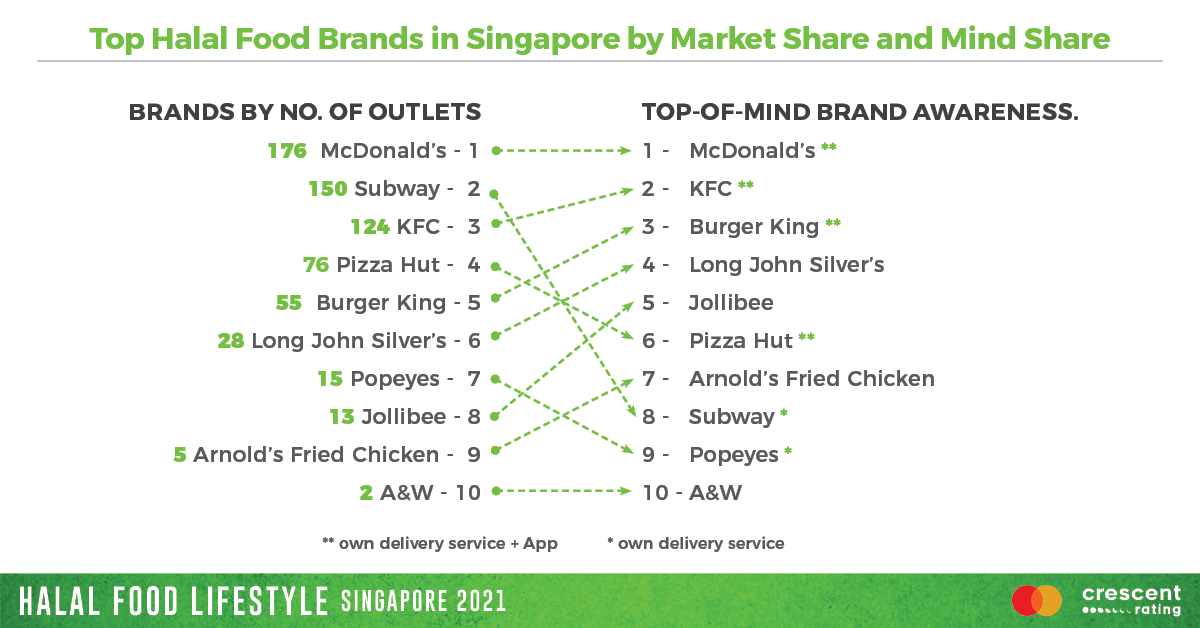
As we navigate through the recovery phase of COVID-19, turning our focuses inward towards our domestic markets, the next iteration of our Mastercard-CrescentRating reports shifts its focus to the F&B industry and ways it can better engage with Muslim diners.
We kick off this series with a deep-dive into Singapore’s domestic Halal dining market, as it is known for being a food haven and fusion of cultures. With its unique demographic make-up, and being the top non-OIC Muslim friendly destination in the Global Muslim Travel Index, Singapore poses as a fertile landscape for in-depth research on Halal food ecosystems within non-Muslim-majority countries.
In this article, we explore some key findings from our research, namely on the factors that influence trade and Halal food in Singapore.
Millennials and Gen X have changed the outlook of the food industry over the past few years especially during COVID-19. They have influenced the way the world does business as they are likely to patronize the Food delivery services and takeaways.
Despite turbulence in the food market sector during COVID-19, the trade is gaining momentum again as things are coming to the new normal. Local Muslims in the said age bracket of 24 to 40 years are a huge driving force behind the growth of Halal dining markets.
Researchers have indicated that Gen X spends as much money as millennials to eat, therefore knowing what Millennial and Gen X tick matters to the Food business.
Another factor that has led to a hike in the Singaporean Halal food trade is its wide variety of food. Although Halal food is not available across the island, this does not stop the Muslim consumers from enjoying their favourite delicacies from the establishments concentrated in a few clusters in Singapore. This, however, calls for a need to create more Halal food establishments in the places like west and heartland areas to cater to the needs of local Muslims as well as tourists.
Speaking of the variety of food, Many Halal Asian cuisines have been introduced to cater to Muslim consumers such as Indian cuisine. This suggests that Singaporeans are open to different types of cuisines and this has only been possible due to the availability of Halal ingredients. Therefore, the industry needs to identify the gaps in availability in the regions where there is a lesser number of Halal food establishments as an opportunity to innovate and expand.
There is no doubt that Singapore is a culturally diverse country with a variety of cuisines catering to different ethnicities but the local cuisines continue to hold sway over non-local ones. Malay cuisine followed by Indian, Indonesian and Chinese is the most popular cuisines consumed by the Singaporean Muslim population. With these four ethnicities in dominance, the food sector is influenced by their food patterns.
The Food producers have found opportunities to experiment with cross-culture cuisines while staying true to their traditional tastes because, for the younger lot, refined taste does not suffice – health matters too.
After local cuisines, the Thai, Japanese, and Korean are the most famous ones. Their increased popularity has taken the Halal food trade to the next level. Thai cuisine owes its popularity to the early adoption of Halal food protocols in Singapore. American cuisine was a latecomer in terms of inculcating Halal food policies in their fast food with their food chains going Halal to cater to a wider population especially Muslims. This has primarily happened due to the increased exposure to the media and entertainment industry. For instance, Korean and Japanese cuisine gained popularity among Singaporeans due to eating shows and K-pop culture.
The Halal food industry has grown exponentially in Singapore due to the mobility of cultures across countries. Producers have found new opportunities to venture out into new types of cuisines and fuse them with Asian food. Therefore, by keeping an eye on the pattern of Singaporean Muslim media consumption, the food industry can foresee the growing demands for Halal food.
Despite the growing interest of producers and consumers in Halal non-Asian cuisines, there are still not enough options for Muslim Singaporeans to choose from. Cuisines that do not offer adequate Halal food options are French, Mexican, Greek and Spanish.
The unavailability of diverse Halal foods is primarily because of a lack of knowledge and awareness in the producers of these cuisines in Singapore. The chefs are unaware of the Halal substitutes for their ingredients. Another reason is that replacing alcohol with a Halal ingredient seems odd to the chefs as the dish will no longer stay true to its traditional taste.
This raises a need for entrepreneurs to cater to the needs of the Muslim community by making their cuisines more accessible and Halal friendly. The establishment of eateries not just in tourist areas, the introduction of interesting Halal foods and diversification of Halal food ingredients will boost the Singaporean trade in the long run.
Singapore’s domestic Halal dining market is estimated at SGD 700 million in 2019. Although COVID-19 disrupted this in 2020, this indicates the short to medium term domestic market potential post-COVID. Moreover, with Muslim visitors to Singapore spending SGD 300 million in 2019, the total Halal dining market was estimated to be SGD 1 Billion.
We hope the insights in our report will assist the F&B stakeholders and entrepreneurs to unlock the potential of the Halal food market in Singapore and discover new opportunities as well.